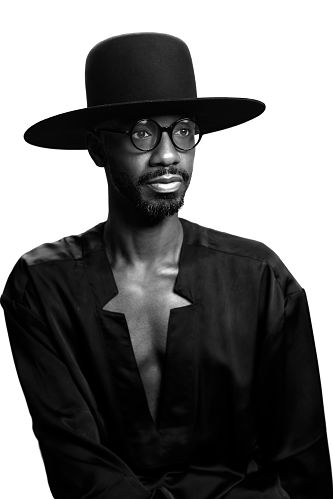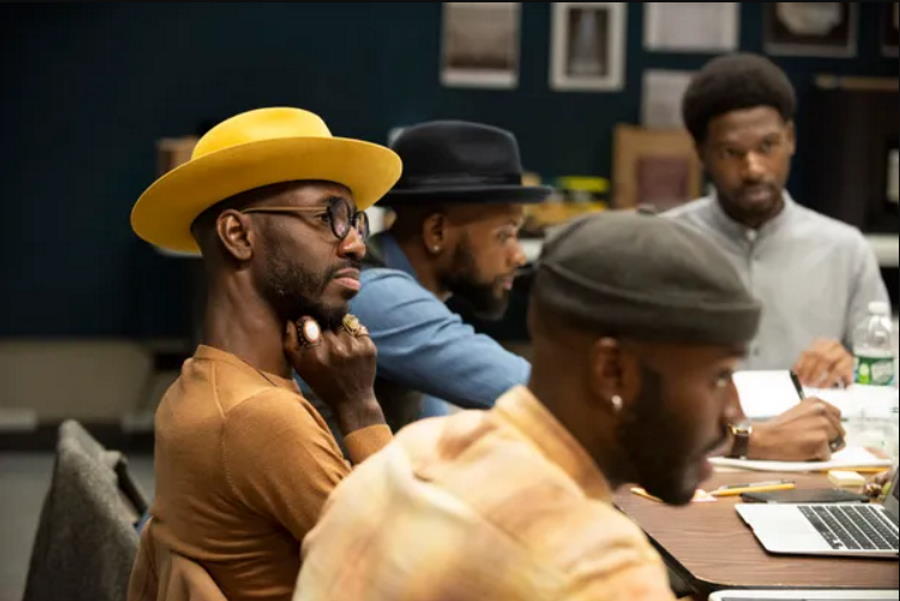On July 15, Donja R. Love, an Afro-queer playwright living with HIV, announced that he would open up submissions for season two of “Write It Out!,” a writing program he created in 2020 for people who are living with HIV.
This capped a very busy year of activity of the writer of such plays as Sugar in Our Wounds, Fireflies, and one in two: Season one of “Write it Out!” culminated in a world premiere staged virtual reading of its cohort’s new plays on Dec. 1, World AIDS Day 2020. Following that milestone, Love immersed himself in completing his own latest work, What Will Happen to All That Beauty? In June, Philadelphia Theatre Company awarded Love its newly revived Terrence McNally Award to develop that play, recognizing him for his commitment to centering themes that McNally encapsulated in his own works: queer identity, social justice, and the transformative power of art. Love’s play focuses on the lives of Black “queer elders” who, during the height of the AIDS epidemic in the 1980s and ’90s, faced rejection and exclusion from both white LGBTQ activists and Black communities, and were thus forced to create safe spaces of their own.
The week before receiving the McNally award, MCC Theatre announced that its 2021-22 season would conclude next spring with a full production of soft, a play that Love began writing 12 years ago, soon after he was diagnosed with HIV. Though many people would have taken the remainder of 2021 off to celebrate, Love was instead preparing to begin facilitating two writing workshops that mirrored the approach of “Write It Out!” The first, “Youth Write Now,” was a two-week free virtual playwriting program that he created for LGBTQ youth between the ages 14 and 18 to help them develop their own voices and narratives. “Youth Write Now” was supported by Rattlestick Playwrights Theater, Pride Plays, and National Queer Theater.
Love’s second program, the “Learning to Love” playwriting fellowship, was designed to facilitate intergenerational collaboration among four Black queer playwrights between the ages of 18 and 35 by pairing them with an older same-gender-loving man so that they could develop a one-act play inspired by their ongoing dialogue about self-acceptance and love. This fellowship is still in development and will premiere the resultant works this fall under the direction of Love’s mentor, John-Martin Green.
As if that weren’t enough, Love’s second season “Write It Out!” has opened submissions. And on Aug. 1, he announced another initiative: the “Write It Out!” prize for playwrights living with HIV. The prize includes a $5,000 cash award and a monetary stipend so that recipients can take the time they deserve to focus on writing, as well as professional dramaturgical assistance in developing a new work. Love notes that to his knowledge it is the first award of its kind dedicated specifically to supporting playwrights living with HIV.
In opening up submissions for the writing program and prize, Love declared himself excited “to see our community write down!” He continued, effusing, “Last year’s writers were so good! I kept saying, ‘These stories are phenomenal! I wish I had written them!’” That’s high praise from Love, and a sign that the playwright has total faith in the narratives that his community has to share.

Love is renowned for transliterating haunting dream sequences into scorching dramas that leave one weeping. It was clear in his first major New York City production, Sugar in Our Wounds, which premiered at Manhattan Theatre Club in 2018. That play revolved around the perilous love affair between two enslaved Black men who refused to give up on each other, even in the face of death, all while coming together in front of an ancient tree that sang out with the voices of their ancestors.
Love’s daring storytelling was most recently seen last summer as part of Playbill’s Pride Plays’ virtual premiere of one in two, a play that first premiered in the fall of 2019 in a New Group production at Signature Theatre in New York. That play riffed on a startling sexual health figure from Centers for Disease Control and Prevention (CDC); That if current infection rates continue, one in two Black gay men will be diagnosed with HIV during their lifetime.
Clearly, Love is unafraid to take on subjects that scare most people, though he is notable for doing so while also sharing the rarely revealed tenderness of Black lives. He is also celebrated in activist circles for his nonstop commitment to fighting for the dignity of people living with HIV (PLWH). Anyone who follows Love on social media knows that he has long been vocal about his devotion the HIV-positive community. And though he has bared his serostatus openly for many years―in order to show others that it is possible to thrive while living with the virus―he is the first to admit that it took some time after he was diagnosed in 2008 before he felt comfortable doing so.
“Stigma kills,” he said of his own reluctance to share his status. “And my own shame about living with this virus and what other people had to say about it left me feeling like I had to hide. Many people feel that way, because disclosing your truth, when you are living with HIV, can result in violence, being kicked out of your home, lost opportunities or relationships.”
In speaking of the violence he has seen as a result of sharing an HIV-positive status, Love said that violence inflicted by words can be some of the worst because “they never leave you.” He shares that there was a time when words that were used against him left him so depressed that he wanted to die.
But just as stigmatized language can kill, Love believes that the language of kindness can be used to transform lives. That is why he relaunched “Write It Out!” With support from a wide range of organizations, including the Lark Theatre, Broadway Cares/Equity Fights AIDS, the Each-Other Project, Mobilizing Our Brothers Initiative, and National Queer Theater, Love turned the first season of “Write It Out!” into a virtual space where PLWH could hold fellowship with and learn from each other.
“I don’t like to say that I was their teacher,” he says. “I learned just as much from them as they learned from me. And being able to come into a space where I didn’t have to explain myself, where everyone just got it right away, was so healing.”
Love mentioned a time that he apologized to his fellow writers for having low energy because, as he recalled, “I’d just gotten my blood work drawn. And as soon as I said that, everyone sighed. They got it. They knew how draining it is to give a pint of blood, and shared their own stories. Right there, I felt so uplifted and seen―it didn’t even feel draining anymore, because we were together.”

With season two of “Write It Out!,” Love is aiming to hold onto that same spirit of camaraderie, as well as having zero tolerance for traditional gatekeeping barriers that have prevented Black people and other people of color from applying to writing programs. “It doesn’t matter what you’ve done before, where you went to college, or how many awards you have,” Love said. “All I care about is, one, do you want to write, and two, do you have a story to tell?”
That means that the first season’s rule holds: that any adult living with HIV is welcome to apply, regardless of their experience level—even if they have never written a single word before in their entire lives. Love is also maintaining his commitment to keep the names and personal information of participants private, because he knows that disclosing one’s status can endanger a person’s life. This might seem counterintuitive in the promotion of a theatre program, but for PLWH, it is a sign that their comfort and safety have been prioritized in this “for us by us” space. As Love put it, “We don’t need anyone else to save us but our own―and as long as people come out of this experience feeling supported and whole, I know I have done my job and helped to create the healing that newly diagnosed Donja needed when he felt that his life was over.”
Last year, this policy around anonymity meant the workshop had to be open to adjusting its original plan to give the works a public reading. It was decided that if any writer involved felt uncomfortable with sharing their work publicly, the entire showing would be made private. Love said that when he revealed this condition to the first cohort, many felt relieved, and it was initially deemed best to keep the presentation private. Love felt sad not to be able to share the cohort’s work publicly, but he said he understood why.
Then, a few days before the World AIDS Day 2020 premiere, the group collectively changed its mind and declared, “I want people to know that I was part of this program.” Though their names were not widely publicized, that they did a public reading of their work at all, with their names credited, was something of a triumph.
Reflecting on the experience, Love said he saw as an indication of “how amazing our community is; these folks are living their truth.” But he said he knows it’s not a given for the second cohort, and he will wait and see how they feel about sharing their work. Whatever their decision, Love is happy to support them.
That support extends to the new “Write It Out!” award. As with the writing program, submissions for the award are private, and when it comes time to announce who received the prize, if the eventual recipient chooses to remain anonymous, their information will not be shared.
In an industry that lost so many lives to the AIDS epidemic, and that is still filled with people afraid to bear their HIV status openly, Love’s initiative is a unifying gesture that goes beyond virtue signaling and does the hard work of elevating the people who need the most support.
That’s why Tony- and Emmy-winning Broadway star Billy Porter and GLAAD have given their financial support to funding the award—because they know what stigma can do to people. In May, Porter himself disclosed that he has been living with HIV. Like Love, he believes that there is no place for HIV stigma in anyone’s life. Similarly, as an organization that has spent decades uplifting the voices of LGBTQ people, GLAAD obviously sees Love’s vision as a continuation of their mission.
To keep the focus on Love’s work, Porter and GLAAD were initially eager to keep their contributions private. But knowing that every bit of publicity can help to get a message out to the people who need it most, they have agreed to allow their involvement to be public. It is all in the service of one goal and one goal only: to help people living with HIV banish their fears and step into the loving arms of those who want to celebrate their beautiful lives.
If you or someone you know would like to apply for “Write It Out!” the writing program, submissions are open until Aug. 15; submission for “Write It Out!” playwrights’ award is open until Sept. 3. For more information, go to letswriteitout.com.
Juan Michael Porter II (he/him) is an arts and culture journalist. He has written for TheBody.com, SF Chronicle, Christian Science Monitor, NY Observer, TDF Stages, Time Out NY, and Token Theatre Friends. He is a 2020 National Critics Institute and 2021 Poynter Power of Diverse Voices fellow.


